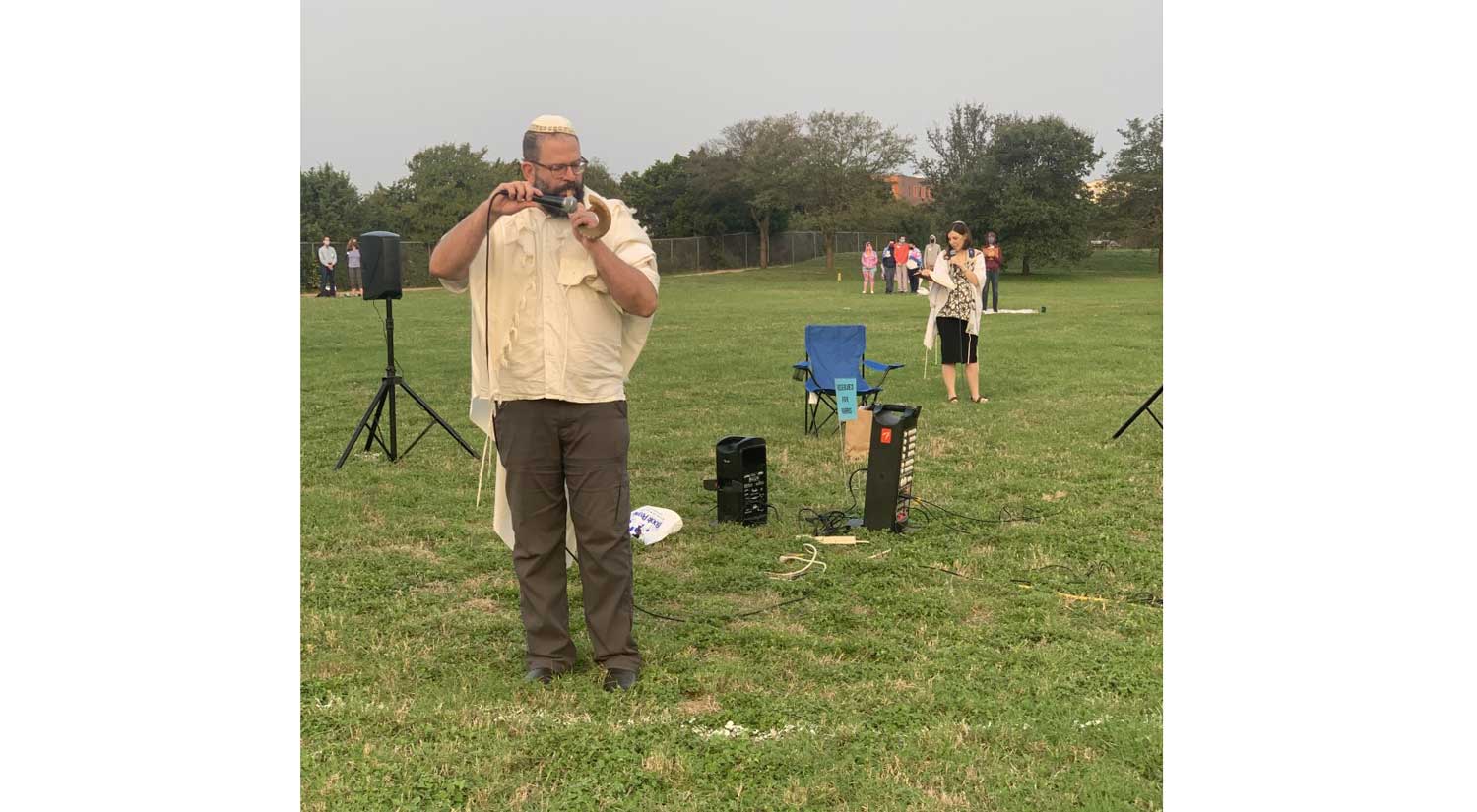
Observing the High Holy Days During COVID-19: Austin Area Congregations Devise Unique Ways to Come Together Virtually and In-Person
Senior Rabbi Neil F. Blumofe plays the shofar at CAA’s Rosh Hashanah morning picnic, as Rabbi Gail Swedroe calls the shofar notes. Credit: Jennifer Rubin
By Tonyia Cone
At a time when many people are craving togetherness and spiritual connection, Austin-area congregations came up with creative ways to celebrate and observe the High Holiday season while being mindful of COVID-19 safety measures.
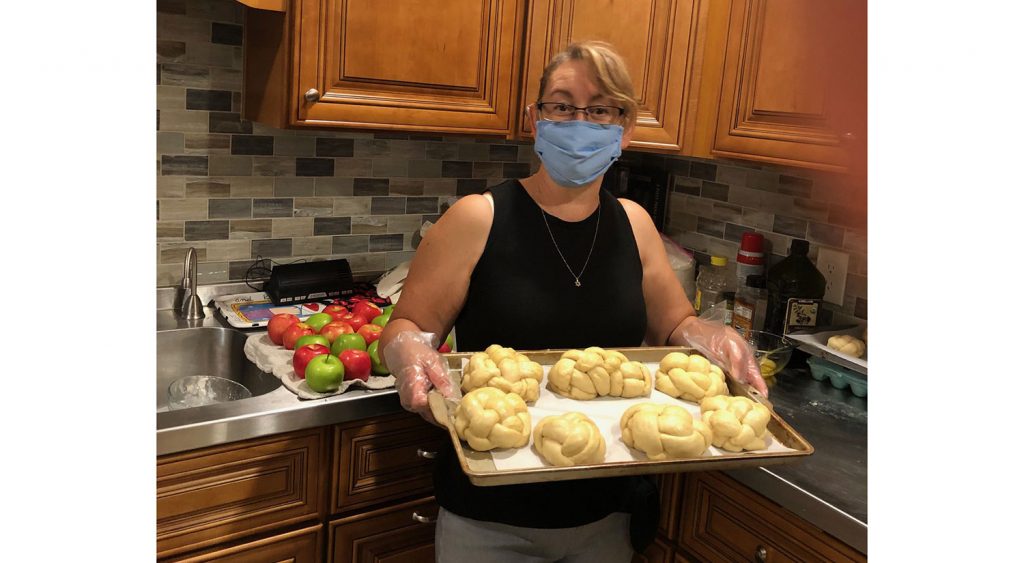
Claudia Aguilar, Sisterhood vice president, making round challot for Rosh Hashanah goody bags. Courtesy Congregation Beth El.
Most synagogues in Austin have offered services virtually since the spring, and continued to do so throughout the High Holiday season.
This year, due to the pandemic, Congregation Beth Israel held all High Holiday services and events online via livestream and Zoom.
“While our online services will remain accessible to people everywhere, we are as committed as ever to building a unique and deeply meaningful experience for our members, with special events and select content available only to Congregation Beth Israel members,” said the congregation’s website.
In addition to services, CBI moved its annual donation drive for the Central Texas Food Bank online, continuing to give CBI members the opportunity to provide thousands of meals to local neighbors.
Temple Beth Shalom also offered opportunities to repair the world, including a High Holy Day tikkun olam focus on Community First! Village, a 51-acre community that provides affordable, permanent housing and a supportive community for the disabled, chronically homeless in Central Texas.
“This crisis has heightened the need to move our homeless neighbors off the streets where they can be safe, cared for and surrounded by a loving community,” explained the TBS website. “Your donation will help support this vital expansion and make a real difference.”
The TBS website also encouraged donating to the Central Texas Food Bank and Shalom Austin’s COVID-19 Community Response Fund.
TBS services were held online, in addition to curbside prayer book pickup for members and a shofar blowing in the parking lot, with viewers in their own cars. The congregation also mailed member engagement kits with items to help observe the holy days, such as a Havdalah candle, spice bag and printed materials for guidance, such as how to perform Tashlich.
Other TBS online events included a Zoom session by clergy and High Holy Day co-chairs about how the High Holy Days would be observed remotely at the congregation, and how to create a holy space in the home for observance. In addition, the congregation partnered with Austin Jewish Film Festival for S’lichot programming.
Congregation Shalom Rav made every effort to ensure that their High Holiday services, also online, remained as inclusive and familiar as ever.
Sheila Frankfurt, CSR board member at large, explained that in addition to the congregation’s usual services — Erev Rosh Hashanah, Rosh Hashanah day, Erev Yom Kippur, and Yom Kippur day — CSR offered a children’s shofar service on Rosh Hashanah day.
Rabbi Monty Eliasov led CSR’s services, with live music provided by Barbara Taft and Abraham Davidson. Members participated throughout each service by contributing readings and prayers from their homes, via Zoom.
CSR also took measures to set up stringent Zoom security, in coordination with recommendations from Shalom Austin staff, and felt they could provide a safe virtual environment, she said.
“Since CSR has been holding Zoom Shabbat services since the beginning of the COVID quarantine, we are confident our High Holidays will be extremely successful,” Frankfurt explained.
“In fact, we’ve been happily surprised by those in attendance at our weekly services; it seems that reconnecting with organized Judaism may be an unexpected silver lining of these times. We’ve been blessed to be joined by members and nonmembers, some new and some old friends, from all across the country and are grateful for the chance to reconnect with so many,” Frankfurt added.
Many congregations combined online services with personal touches.
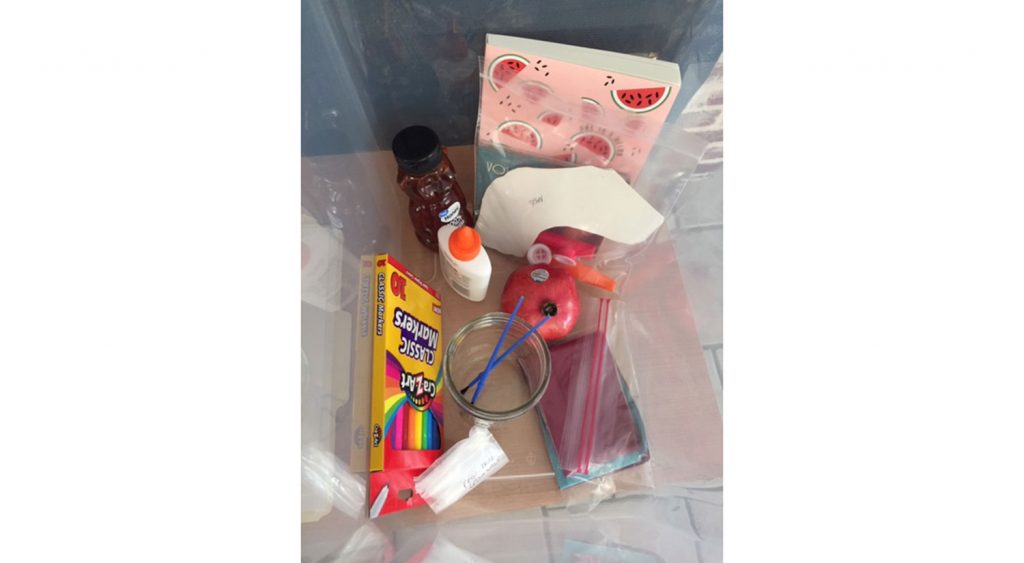
Items from the Congregation Kol Halev September Sunday School at Home box, containing items families needed for Rosh Hashanah and Yom Kippur activities. Credit: Sherry Blum
This year, Congregation Kol Halev is running its Sunday School as a family home-centered Jewish learning experience, with a focus on the holidays.
Sunday School Administrator Sherry Blum explained that the school provided a CKH September Sunday School at Home Box, containing everything participating families needed to celebrate Rosh Hashanah and Yom Kippur at home.
Some of the items the box included were materials for making a shofar-kazoo, a “stained glass” Tzedakah box, bath salts for a bathtup Tashlich, a Tikkun Olam project (sending Rosh Hashanah greeting cards to seniors), and a journal for families to record their experiences of holidays.
In addition to families’ home celebrations, CKH holds one Zoom celebration per month, when families can share their favorite parts of their celebrations and teachers demonstrate crafts and lead songs and other online activities. They also held a second day Rosh Hashanah family celebration, among the other CKH Zoom services led by Rabbi Lev Baesh and singer-songwriter Sue Horowitz.
Blum said, “Our CKH services are being done in a modular way so that people can come for whatever part they are most interested in to accommodate people’s shorter attention span while Zooming. For similar reasons, sermons are planned to be shorter than usual.”
Congregation Beth El and Congregation Shir Ami offered congregants the opportunity to pick up High Holiday Machzorim, the prayer book used during the holidays.
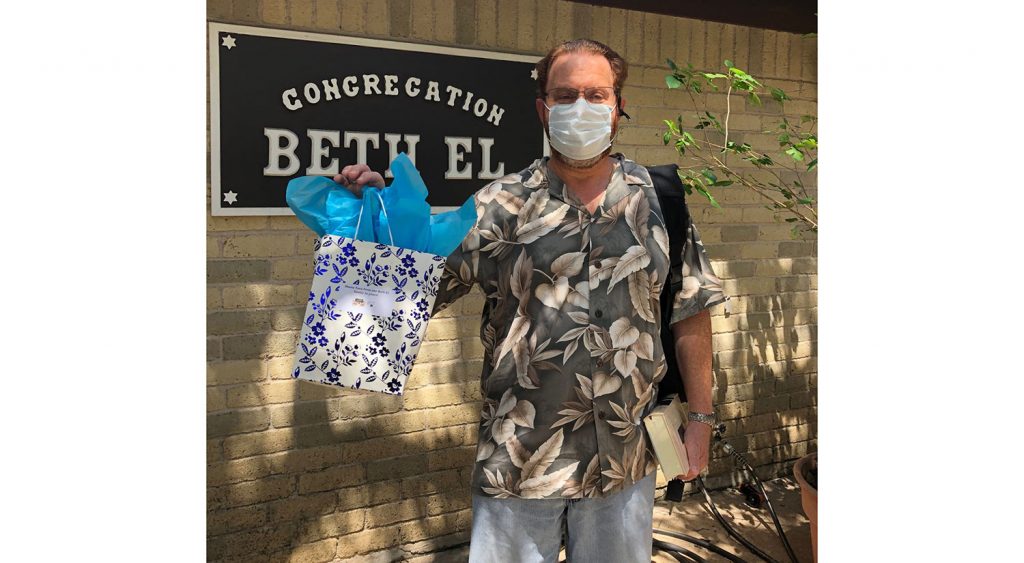
Scott Berman, picks up his High Holiday goody bag and machzor. Photo courtesy of Congregation Beth El.
Iris Koeller, CBE volunteer, explained that the congregation also put together care packages with honey cakes and round challah baked in CBE’s kosher kitchen, grape juice and candles, apples and honey, and a Jewish calendar courtesy of Mitzi Chafetz.
The congregation’s sanctuary and community hall were set up with enhanced audio-visual capabilities in order to live-stream their services. They anticipated people joining the services from all over the United States, including members who have moved out of state.
In addition, CBE held at least a minyan and outdoor shofar blowing in person, by reservation, to make the shul services as authentic and kosher an experience as possible.
Koeller said, “We are a congregation that in normal years does not even take tickets for the High Holidays. People know they have a Jewish home away from home, so this year are especially saddened that we can’t open the door to every Jewish person who needs a place to pray and connect to people. But of course we hope to resume that again soon.”
Congregation Shir Ami, meanwhile, offered contactless pickup of bags for donating food and a special goodie bag of holiday related treats along with their Machzorim.
CSA leaders took special care when planning the online schedule to take into account Zoom fatigue. They were flexible about the schedule, adjusting plans and services for Zoom timing because of how tired people get while on Zoom calls. Those involved in planning also strove to maintain the congregation’s commitment to community, keeping the programing live and interactive on Zoom with volunteers engaged throughout services, discussions and family programming.
Congregation Agudas Achim kept most of its services online but offered some in-person events as well.
In additional to traditional services, online offerings included a Hallway Channel, where people could take a break while meeting old and new friends, as they might if they were in a synagogue hallway during a long service. A Youth Channel offered age-appropriate services and celebration opportunities and a Teen Channel featured a teen lounge and text study.
In-person events, open only to current members of CAA, required registration and limited space was available. Those events included a Rosh Hashanah shofar picnic; a Kol Nidrei tailgate, which included a pre-fast dinner and drive-in style viewing of the Kol Nidre service; and a Neilah sanctuary walkthrough, which, also available over Zoom, gave participants a moment of personal reflection in front of the ark and Sifrei Torah to mark the end of the High Holy Day season.
Congregation Tiferet Israel held its High Holy Day services in person. As an Orthodox synagogue, a virtual synagogue service was not possible because it would violate their Shabbat and Yom Tov.
“Given this absolute requirement, Rosh Hashana and Yom Kippur services would be in person, or not at all,” said Beth Shapiro, CTI board member.
For Rosh Hashana and Yom Kippur, CTI’s services were conducted in the Shalom Austin JCC gymnasium in order to accommodate more people.
“We’ve worked very closely with Shalom Austin in order to design a layout that will enable participants to remain at least six feet apart and yet be able to feel connected to a congregation and hear services,” said Beth Shapiro, Congregation Tiferet Israel board member.
In addition to incorporating changes CTI has made to services since resuming in-person worship this summer, CTI modified High Holiday services.
For Rosh Hashana, the CTI shofar was blown in the Shalom Austin JCC courtyard. Since the mitzvah is to hear the shofar blown, Shapiro explained, the door was open and the congregation could hear it from their seats.
They also blew the shofar during the Tashlich service, outside in the garden at the campus in the afternoon of the second day of Rosh Hashana, so people who were reluctant to come to an indoor service could still fulfill the mitzvah of hearing the shofar on Rosh Hashana.
In normal years, CTI brings in another rabbi and chazan to assist with High Holiday services. But this year, COVID-19 made it impossible for them to travel to Austin, so Congregation Tiferet Israel’s Rabbi Daniel Millner and community volunteers led services. All who led prayer services or read the Torah took a COVID-19 test just before Rosh Hashana.
“We shortened our service, keeping the prayers that must be included as well as prayers that are traditional but not halachically required. The goal is to keep the service as short as possible while still providing a meaningful and halachically acceptable experience,” said Shapiro.
All who attended CTI’s High Holiday services were required to sign up in advance. No one was admitted who did not make a reservation, and everyone was required to wear a mask and social distance.
“We’re doing as much as we can do within what’s reasonable and effective, and we recognize that for some people they will not be comfortable with the risk. But we do hope that for those that do join us at these services, they will feel that they can bring in the New Year with their community and with hope for a sweet and good year full of blessings,” she added. ■
Congregation Tiferet Israel Carefully Resumes In-Person Prayer, with a Twist
In addition to shutting down in-person services in March, Congregation Tiferet Israel formed an ad-hoc Medical Committee early on in the pandemic, comprised of members with medical backgrounds. The committee is intended to help congregation leadership navigate the pandemic, and committee members advised leaders about when to consider opening up the shul for services again and how to do so safely.
“We also carefully considered the guidelines put together by the Orthodox Union, which published in May a comprehensive operational guide for Orthodox synagogues during the pandemic,” CTI Board Member Beth Shapiro said.
“We are fortunate in that the city of Austin’s incidence of COVID has been going down and is significantly lower than it was at its height in July,” said Shapiro, explaining that in late August, CTI resumed in-person services for Shabbat morning and evening minyonim when requested by a congregant who needed to say Kaddish.
Shapiro explained that evening minyonim are conducted outside, but Shabbat morning services are conducted inside B’nei Abraham.
“Our seating capacity was greatly reduced in this little white steepled building, and we are limited to about 35 people with social distancing guidelines requiring our seats to be 6 feet apart,” she said. “Everyone is required to sign up in advance and wear a mask to services. Of course, we also have guidelines for our congregants that ask them to stay home if they have any of the long list of COVID symptoms.”
Leaders also made a number of changes to the way in-person prayers are conducted in order to minimize risk and person-to-person and person-to-object contact, such as limiting contact with the Torah. While normally multiple people get to touch the Torah, read from it or go up for an aliyah, raise it high (hagbah), and re-cover it (galilah), now one person removes the Torah from the ark, brings it to the bimah, uncovers it, reads from it, raises it up at the end of the Torah service, covers it, and brings it back to the ark.
Additionally, people who lead various parts of the service do it from their seats rather than going up to the bimah, as is normally done. ■
Latest Posts
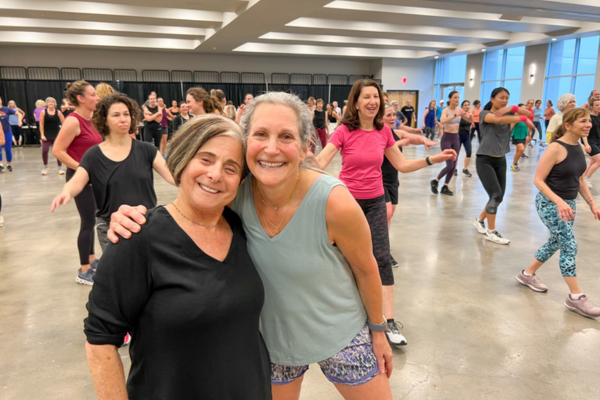
Dell JCC Celebrates its Members with Two Milestone Events in April and May
Members enjoy a Mega Zumba event to celebrate the Dell JCC's one-year anniversary on April 26, 2024. Credit: Dalia Galpern By Thy Hooks and Wendy Goodman The Dell JCC celebrated the first anniversary of its new building opening on April 26, 2024. To mark the...
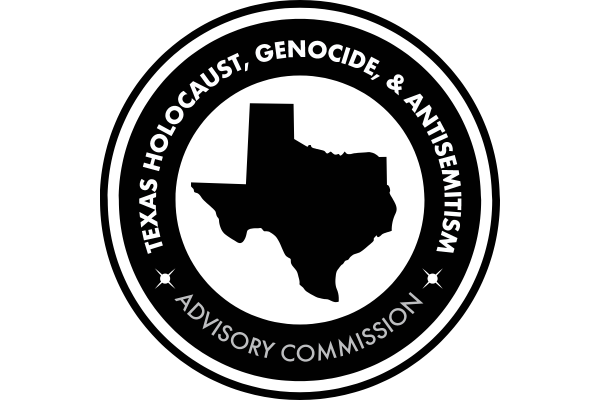
Efforts to Fight Campus Antisemitism Welcomed by Texas Commission
The Texas Holocaust, Genocide, and Antisemitism Advisory Commission (THGAAC) welcomes Governor Greg Abbott’s recent executive order to fight antisemitism at colleges and universities and ensure a safe learning environment for Jewish students and all Texans. “We are...
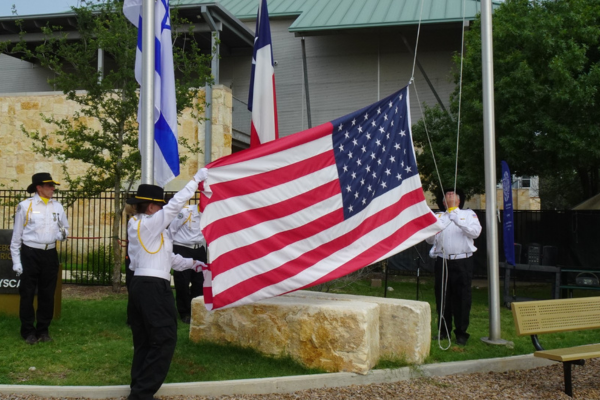
Memorial Day Mitzvah: Jewish War Veterans Post 757 Honors the Fallen
From left to right: Gregg Philipson holding bugle; Alana Pompa and Bob Kaplan beginning to hoist the flag. Credit: Steve Krant By Steve Krant, U.S. Air Force (Retired) In a time-honored tradition, Austin’s Post 757, Jewish War Veterans of the USA (JWV) performed a...
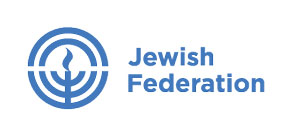
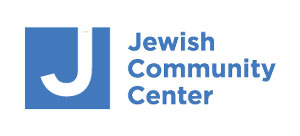
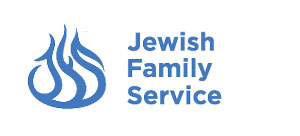
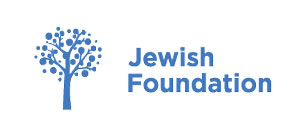
HEALTH & WELLNESS
Fitness
Swimming
Tennis & Pickleball
Sports
EDUCATION
Jewish Culture & Education
Early Childhood Program Preschool
After School & Childcare
Camps
ARTS & CULTURE
Literary Arts
Visual Arts
Theatre & Film
Dance
COUNSELING & SUPPORT
Jewish Family Service
Counseling & Groups
Case Management
References & Resources
Copyright Shalom Austin 2025. Privacy Policy.
